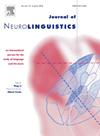Does sounding ‘Gay’ or ‘Straight’ affect how we understand language? Sentence comprehension is regulated by the speaker's perceived sexual orientation
IF 1.2
3区 心理学
Q2 LINGUISTICS
引用次数: 0
Abstract
Social interactions are shaped by the way individuals communicate. Listeners form impressions based on how someone sounds, and the message conveyed can be interpreted differently depending on who the speaker is. We investigated on-line sentence processing focusing on the role of the speaker's gay- vs. heterosexual-sounding voice in the construction of meaning. Event-related brain potentials were recorded while participants listened to two gay- and two heterosexual-sounding male speakers uttering stereotypical sentences. We manipulated whether the sentences referred to professions stereotypically congruent or incongruent with the speakers' perceived sexual orientation. Results showed that the interplay between the speaker's voice and message content influenced sentence processing early after an incongruent stereotype was presented. The interaction was maximal at frontal sites, with a larger negativity for stereotypically-congruent than for stereotypically-incongruent professions when uttered by gay-sounding speakers. These results suggest that the perception of the speaker as gay- or straight-sounding is quickly used by listeners to build the message meaning. The inconsistency between vocal and linguistic information modulates a frontal negativity, potentially indicating control processes during sentence comprehension put in place to deal with the inconsistency.
听起来“Gay”或“Straight”会影响我们对语言的理解吗?句子理解受说话者感知到的性取向的调节
社会互动是由个人交流的方式决定的。听者会根据一个人的声音形成印象,而所传达的信息也会因说话者的不同而有不同的理解。我们调查了在线句子加工,重点关注说话者的同性恋和异性恋声音在意义构建中的作用。当参与者听到两个听起来像同性恋和两个听起来像异性恋的男人说话时,记录下与事件相关的大脑电位。我们操纵这些句子所指的职业是否与说话者的性取向刻板一致或不一致。结果表明,说话者的声音和信息内容之间的相互作用会在不一致刻板印象出现后早期影响句子加工。当听起来像同性恋的说话者说出与刻板印象一致的职业时,这种相互作用在前额部位最大,比在刻板印象不一致的职业时产生更大的负面影响。这些结果表明,听者很快就会利用说话人听起来是同性恋还是异性恋的感觉来构建信息的含义。语音信息和语言信息之间的不一致调节了正面消极性,潜在地表明句子理解过程中的控制过程是用来处理不一致的。
本文章由计算机程序翻译,如有差异,请以英文原文为准。
求助全文
约1分钟内获得全文
求助全文
来源期刊

Journal of Neurolinguistics
医学-神经科学
CiteScore
3.90
自引率
5.00%
发文量
49
审稿时长
17.2 weeks
期刊介绍:
The Journal of Neurolinguistics is an international forum for the integration of the neurosciences and language sciences. JNL provides for rapid publication of novel, peer-reviewed research into the interaction between language, communication and brain processes. The focus is on rigorous studies of an empirical or theoretical nature and which make an original contribution to our knowledge about the involvement of the nervous system in communication and its breakdowns. Contributions from neurology, communication disorders, linguistics, neuropsychology and cognitive science in general are welcome. Published articles will typically address issues relating some aspect of language or speech function to its neurological substrates with clear theoretical import. Interdisciplinary work on any aspect of the biological foundations of language and its disorders resulting from brain damage is encouraged. Studies of normal subjects, with clear reference to brain functions, are appropriate. Group-studies on well defined samples and case studies with well documented lesion or nervous system dysfunction are acceptable. The journal is open to empirical reports and review articles. Special issues on aspects of the relation between language and the structure and function of the nervous system are also welcome.
 求助内容:
求助内容: 应助结果提醒方式:
应助结果提醒方式:


